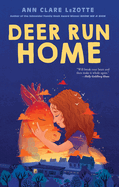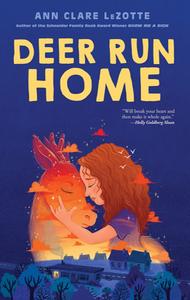
 Ann Clare LeZotte (Show Me a Sign) takes inspiration from a real-life court case and her own experiences as a "completely deaf" member of the Deaf community to sensitively explore language deprivation among deaf children in Deer Run Home, a devastating but hopeful middle-grade novel-in-verse.
Ann Clare LeZotte (Show Me a Sign) takes inspiration from a real-life court case and her own experiences as a "completely deaf" member of the Deaf community to sensitively explore language deprivation among deaf children in Deer Run Home, a devastating but hopeful middle-grade novel-in-verse.
Twelve-year-old Effie, who's deaf, speaks American Sign Language (ASL), which her family refuses to learn. She and her 16-year-old sister, Deja, are living with their mom and stepdad during the Covid-19 pandemic when Effie starts having bad dreams: "I was locked/ in a closet without/ a doorknob./ Nightmare man,/ long hands." Effie's mom will listen only if Effie uses her oral voice--something that "feels faraway/ too hard, not mine"--so, reasoning that Effie is "acting out," Effie's mom sends the girls to their dad's. It isn't much better at Dad's trailer--he stomps on the floor or claps in her face and points to things to communicate. Her one comfort is Golden Eyes, a lone deer who's been separated from his herd because of the "new, small-box/ too-close-together houses" being built on the deer's land. She knows what it's like to not have a welcoming home and vows to try to keep him safe. When schools reopen, Effie is assigned to a new school; fortunately, her previous ASL interpreter, Miss Kathy, will be there, too. Signing with Miss Kathy after not signing for so long is like "all the dead plants/ on our porch/ coming alive/ from a downpour,/ then flowering." Miss Kathy notices that Effie is being neglected, so she convinces Effie's dad to let the girl stay with her for a month. But Miss Kathy senses that something far worse may have happened to Effie. Is Effie ready to unlock those memories?
Deer Run Home is a heartrending novel that deals with the pain and trauma of child sexual abuse and neglect yet remains encouraging in its exploration of resiliency, advocating for oneself, and self-worth. LeZotte deftly contrasts the neglect and abuse Effie experiences at home with the support and compassion she receives at school. Effie feels invisible, as if she "could be a/ wall hanging,/ a mounted TV,/ or a ticking clock" when she's with Deja. But Effie's new friend, Cait, who has cerebral palsy, wants to learn ASL, and Effie's teacher encourages Effie: "lean into your way with words." LeZotte also adroitly connects the community's treatment of nature to Effie's family's view of her as a nuisance. Effie, like the displaced deer population that "can never be anywhere safe,/ because it's all been taken away," has no sanctuary. A moving, emotionally affecting novel. --Lana Barnes, freelance reviewer and proofreader
Shelf Talker: A heartrending yet encouraging middle grade novel-in-verse that explores language deprivation among deaf children.

